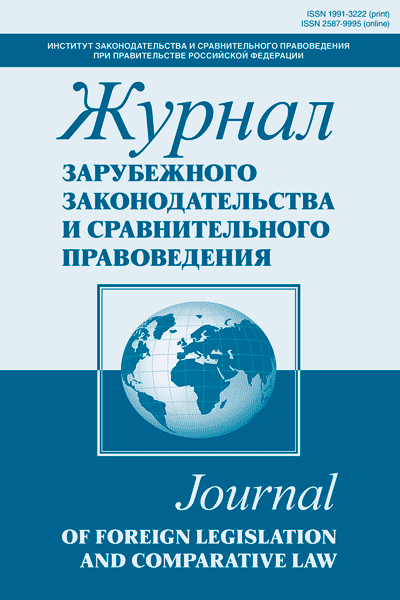The article deals with the relation of the law and departmental law-making in France according on three types: the unity, “spreading”, the openness of the law-making process. The first view of the law-making in France is the unity in the framework of which the question of ensuring the unity of the European Union is developed. Particular attention is paid to the government’s management of the legislative process, the government authority to issue by-laws, the procedure of drafting legislation and decrees of general importance. The second type of realization of law-making in France — outside the Government activity law-making — “spreading”. The impact on the performance of law-making is revealed, new sources of law-making such as acts of European Union are marked, independent state bodies, local self-government. Particular attention is paid to such new phenomena as the legal normativity soft law (“soft law”, “droit souple”). Regarding the third kind of the law-making — the openness — it is noted that the process of law-making is not limited to the relationship between the Government and the Parliament, and all sectors of society and interest groups are involved in that process. It is noted that the amendment to the Constitution, adopted in 2008, resulted in a significant reform of the legislative production. When writing this article except for general scientific research methods (analysis and synthesis), the author has used the formal-logical, theoretical, systematic legal, historical and comparative law. Scientific novelty of the work lies in the comprehensive and systematic approach to the study of the relation of the law and guided-governmental lawmaking in France, which is conducted in three species. Analysis of the development of the main types of law-making in France and law inforcement practice at the present stage is of great scientific and practical importance. The research results can be taken into account in the development of proposals for the implementation in the Russian Federation of new approaches in law-making, adequate to modern socio — economic development of the country, relevant to the international-legal standards and the experience of foreign countries.
Law-making in France, reform of the legislative production, constitution, the object of reference of the legislature, regulation, by-law regulation, decree, the European Union, the Ministry, agencies, an independent state agency, local government.
1. Ardant Ph. Le Premier ministre en France. P., 1991.
2. Bonduelle A. Le pouvoir d’arbitrage du Premier ministre. P., 1999.
3. Claisse A. Le Premier ministre de la Cinquième République. P., 1970.
4. Fournier J. Le travail gouvernemental. P., 1987.
5. Frier P. L., Petit J. Droit administratif. 9 éd. P., 2014.
6. Gicquel J. Droit constitutionnel et institutions politiques. 28 éd. P., 2014.
7. Lanceron V. Du SGCI au SGAE: Evolution d’une administration de coordination au coeur de la politique européenne de la France. P., 2007.
8. Le Pourhiet A.-M. Les ordonnances: la confusion des pouvoirs en droit public français. P., 2011.
9. Marcou G. “Les régulateurs sont-ils responsables?”. Mélanges en hommage au professeur Laurent Richer. Dalloz, 2013.
10. Marcou G. L’accès aux emplois publics. P., 2014.
11. Marcou G., Moderne F. Droit de la régulation, service public et intégration régionale. P., 2006. Vol. 2.
12. Schrameck O. Dans l’ombre de la République. Les cabinets ministériels. P., 2006.
13. Sénat. Les ordonnances prises sur le fondement de l’article 38 de la Constitution. Février. 2014.
14. Marku Zh. Rol´ zakonodatel´stva na sluzhbe sotsial´nogo progressa vo Frantsii: zakon i dogovor. IX International School-Atelier de jeunes juristes sur le thème de “la loi et du développement social”. P., 2014.





